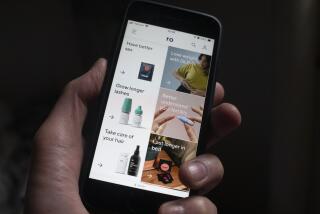HEALTH : Healthy Dose of Video : Medical providers turn to taped programs to give patients in-depth information on self-care and lifestyle topics.
- Share via
“Watch this video and call me in the morning”--that may be the new prescription of the ‘90s.
The major causes of illness and death today are lifestyle related, said Dr. Antronette Yancey, an adjunct assistant professor at the UCLA School of Public Health. Practitioners are recognizing that the information they need clients to understand is increasingly complex and often not suitable for a five-minute--at best--discussion at the end of a physical exam.
So health maintenance organizations, clinics, private physicians and even video stores are making health information videos available to consumers at little to no cost. “It’s the new wave in health education,” Yancey said.
Members of the Kaiser Foundation Health Plan Inc. in Southern California recently got a newsletter with a $5 mail-in offer for a 10-minute breast self-exam video in English or Spanish. Other tapes, available to non-members as well, include: “Helping Your Child Sleep Through the Night” ($18); “Chair Dancing,” an exercise tape for people with physical limitations ($15), and “Video Aspirin” ($15), a relaxation tape. A baby-care basics tape is free.
In addition to purchasing the tapes, consumers can walk into Kaiser’s Health Education Learning Place (HELP) Center in Woodland Hills and view tapes on diabetes, high blood pressure, breast feeding and the human immunodeficiency virus and acquired immune deficiency syndrome.
“People like video,” said Sarah Anderson, a registered dietitian and health education coordinator at Kaiser Permanente, Woodland Hills. “People learn in different ways and video offers multi-sense stimulation. And there is a large population of people--younger people who can’t come to classes held during the day and the seniors who don’t like to go out at night--for whom video is far more convenient than attending classes,” she said.
Some experts in health education argue that for many topics, home video is an ideal way to learn. Watching a breast exam tape, a woman can practice the technique while she watches the video, something she could never do in a practitioner’s waiting room. Videos on sensitive or complicated topics may be better absorbed in privacy, many say.
But videos have their downside, too, and consumers should be aware of what they are missing when they get their health education electronically, Yancey said.
Information in a video may no longer be correct; printed brochures are easier and cheaper to update, she said. Unless the video offers a toll-free number or practitioner access, questions or misconceptions may not be cleared up without the personal interaction a consumer would get in a class or in direct contact with a practitioner.
If a video is seen in a waiting room, the consumer may not get to see the entire production and could miss the most important part of the educational message, she added. For some people, the cost of the video is prohibitive.
“Video works best as a synergy with live people; it makes both vehicles--video and live teaching--more effective,” Yancey said. Research also has shown, she added, that videos are most effective when the actors are seen by the viewer as a “PLU -- Person Like Us.” It’s important, she said, that there be a cultural fit between the video and the viewer, or else the information may be seen as irrelevant.
Yet Yancey acknowledges that with time being at a premium for many and with prevention receiving new emphasis in the design of health-care programs, videos will be increasingly used to enlighten patients about health. Public service health videos are available at no cost at many video rental stores, offering titles on topics such as smoking cessation, nutrition and safe driving tips.
“I’d like to see more and more health videos available in rental stores at no cost,” Yancey said.
Home health videos may just be the beginning. Soon consumers will be bringing home interactive videos that may be almost as exciting as the video games their children are playing, Anderson predicted.
Where to Go What: Free viewing of tapes on diabetes, high blood pressure, breast feeding and HIV/AIDS at Kaiser’s Health Education Learning Place (HELP) Center, 5601 De Soto Ave., Woodland Hills. Call: (818) 719-4536 for information on viewing tapes or to obtain Kaiser Permanente videotapes on health issues.






